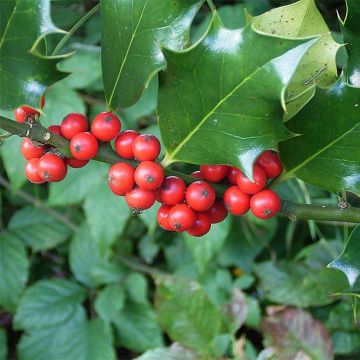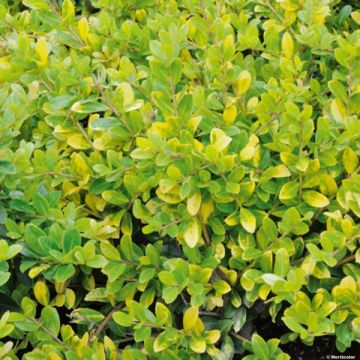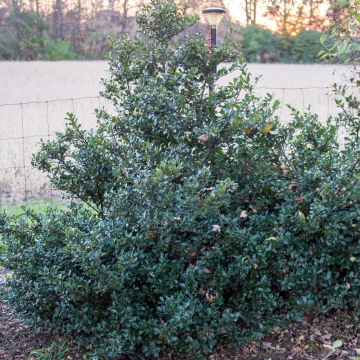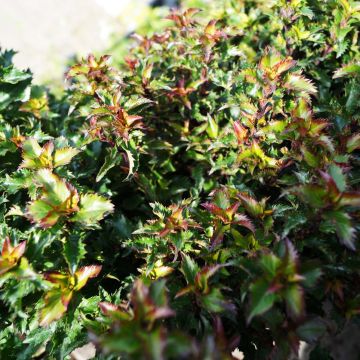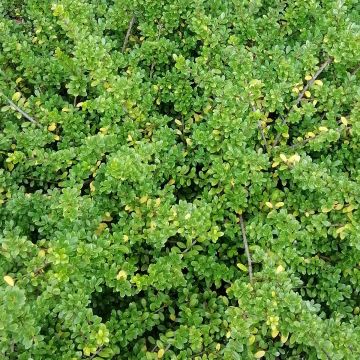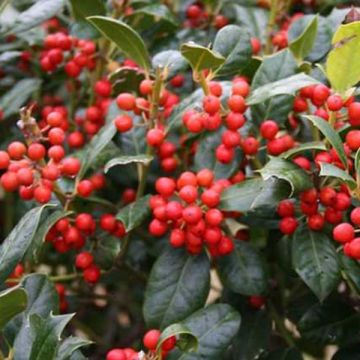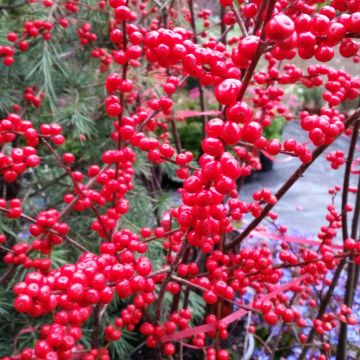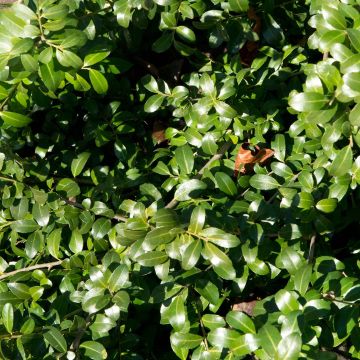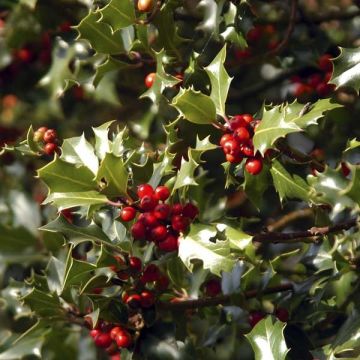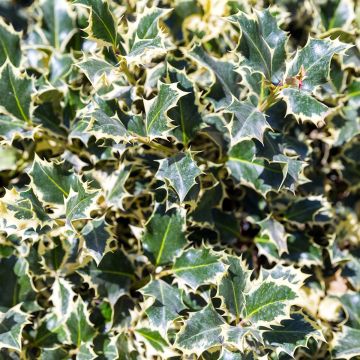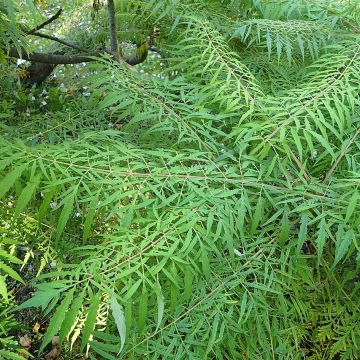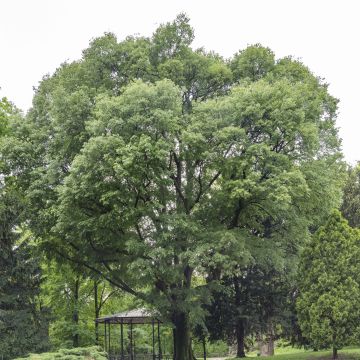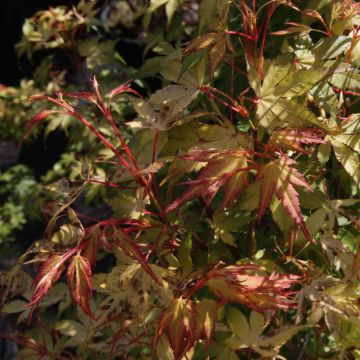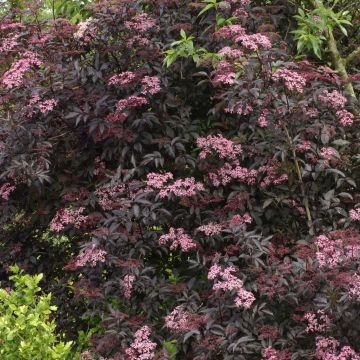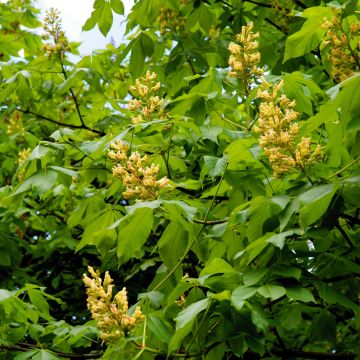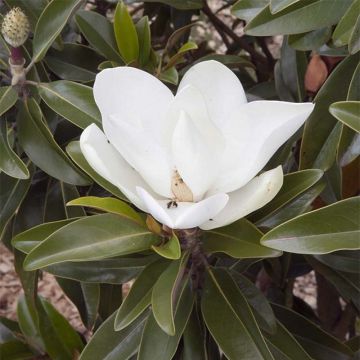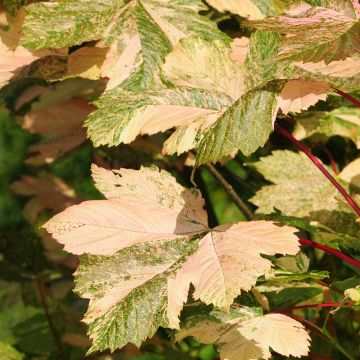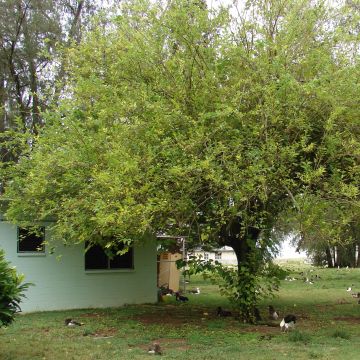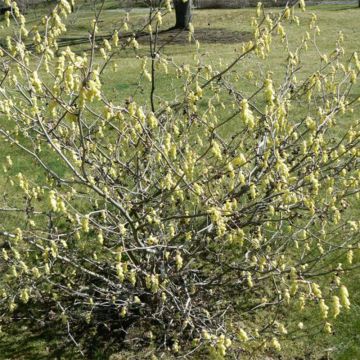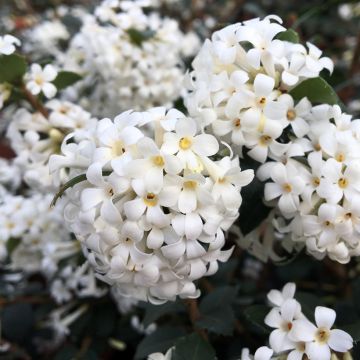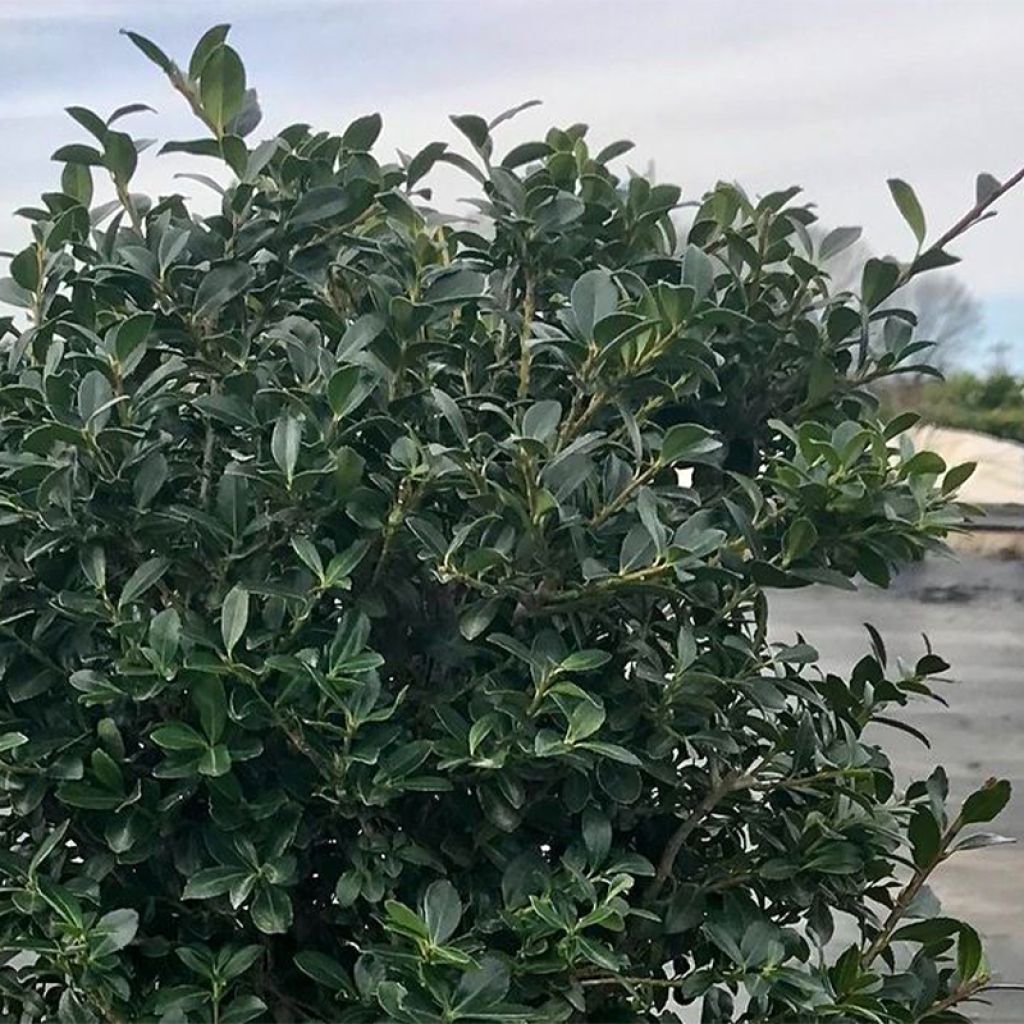

Ilex crenata Green Lustre - Japanese Holly


Ilex crenata Green Lustre - Japanese Holly
Ilex crenata Green Lustre - Japanese Holly
Ilex crenata Green Lustre
Japanese Holly, Box-leaved Holly, Box-leaved Ilex, Dwarf Holly
This item cannot be shipped to the selected country
Delivery charge from €5.90
Delivery to Corse prohibited
More information
Schedule delivery date,
and select date in basket
This plant carries a 24 months recovery warranty
More information
We guarantee the quality of our plants for a full growing cycle, and will replace at our expense any plant that fails to recover under normal climatic and planting conditions.
From €5.90 for pickup delivery and €6.90 for home delivery
Express home delivery from €8.90.
Delivery to Corse prohibited: UE law prohibits the import of this plant from mainland France to Corse as part of the fight against Xylella fastidiosa. Please accept our sincere apologies.
More information
Does this plant fit my garden?
Set up your Plantfit profile →
Description
Ilex crenata Green Lustre is a variety of Japanese holly that can successfully replace Boxwood in the garden, in non-calcareous and not too dry soils. This non-prickly evergreen bush, with small dark green glossy leaves, can be shaped into any desired form and has the advantage of being disease-resistant. The female plants produce pretty black berries from September to March. It is very hardy, with slightly faster growth than boxwood, and prefers a sheltered position away from scorching sun. Often used in Japanese gardens, it works well as topiary as it tolerates pruning very well.
Holly is the only genus in the family Aquifoliaceae, but there are several hundred species! The Crenate Holly, Ilex crenata, is one of those without thorns and is quite different from our Common Holly. This species is a shrub native to the Far East, but as it has been introduced and used in Japan for centuries, it has inherited the common name of Japanese Holly. Now a typical tree in Japanese gardens, it owes its popularity to its ability to be shaped into topiary and cloud-like forms.
The 'Green Lustre' variety grows quite slowly, reaching only about 90 cm (35.4 in) in height at around 10 years old, with a width of about 1.60 m (5 ft 2 in). At maturity, it can form a shrub 1.5 m (4 ft 11 in) tall and 2.5 m (8 ft 2 in) wide, making it valuable for small gardens. This compact and dense bush, with a broad and bushy habit, displays beautiful dark green, glossy, evergreen leaves without thorns. It is a dioecious plant, with female plants bearing small toxic black berries of about 6 mm (0.2 in), which remain on the plant for quite some time. The insignificant white flowers in May-June are aesthetically unremarkable due to their very small size. However, they are nectar-rich and therefore beneficial to bees. This very hardy bush is capable of withstanding temperatures as low as -27°C in good growing conditions. It has a preference for cold winters followed by temperate and not too dry summers due to its geographic origin. It grows in a sunny to semi-shaded position, even shaded in hot climates. It is a plant with fairly specific requirements, but has a remarkable feature that it can be be easily pruned.
Aesthetically similar to Boxwood, this Holly is not attacked by the Box Tree Moth and does not suffer from any diseases, making it a very good substitute for this plant. You can use it as a border plant, low hedge or shape it into a ball or any other form. This can allow it to be integrated into a contemporary, French or Japanese garden. With slightly faster growth than boxwood, Ilex crenata 'Green Lustre' will please gardeners who appreciate well-maintained hedges and topiary. In a contemporary garden or for enthusiasts of French gardens where topiaries are in demand, it will accompany other well-suited shrubs such as Lonicera nitida, whose golden or variegated varieties will create a beautiful contrast in colour. In a contemporary garden, you can also combine it with bamboo from the genus Sasa, whose large and graphical leaves will contrast well with its small foliage. In a Japanese garden, it will work well alongside Japanese Maples, Camellias, Rhododendrons, or Nandina domestica, the sacred bamboo with light foliage and decorative red fruits.
Report an error about the product description
Ilex crenata Green Lustre - Japanese Holly in pictures


Plant habit
Flowering
Foliage
Botanical data
Ilex
crenata
Green Lustre
Aquifoliaceae
Japanese Holly, Box-leaved Holly, Box-leaved Ilex, Dwarf Holly
Cultivar or hybrid
Other Ilex - Holly
Planting and care
To plant this holly, add a generous amount of compost to your garden soil in order to slightly acidify the soil while enriching it. If your soil is rich in active limestone, the holly will tend to develop chlorosis (the foliage gradually turns yellow around the veins of the leaf). Choose a sunny to semi-shaded location (even shaded in hot climates). Ilex crenata has a preference for climates that combine cold winters and temperate summers, and are not too hot.
Water (with non-calcareous water) for the first 3 years, especially in summer, in case of prolonged drought and to help the bush establish itself. It will then grow well on its own as it tolerates a certain amount of drought. In the first years, carry out some formative pruning in spring, selecting the branches you want to keep. Ilex crenata is generally free of diseases. As for insects, it may occasionally be attacked by holly leaf miners, white scale insects in spring, and mites and aphids in summer.
Planting period
Intended location
Care
This item has not been reviewed yet - be the first to leave a review about it.
Striking foliage shrubs
Haven't found what you were looking for?
Hardiness is the lowest winter temperature a plant can endure without suffering serious damage or even dying. However, hardiness is affected by location (a sheltered area, such as a patio), protection (winter cover) and soil type (hardiness is improved by well-drained soil).

Photo Sharing Terms & Conditions
In order to encourage gardeners to interact and share their experiences, Promesse de fleurs offers various media enabling content to be uploaded onto its Site - in particular via the ‘Photo sharing’ module.
The User agrees to refrain from:
- Posting any content that is illegal, prejudicial, insulting, racist, inciteful to hatred, revisionist, contrary to public decency, that infringes on privacy or on the privacy rights of third parties, in particular the publicity rights of persons and goods, intellectual property rights, or the right to privacy.
- Submitting content on behalf of a third party;
- Impersonate the identity of a third party and/or publish any personal information about a third party;
In general, the User undertakes to refrain from any unethical behaviour.
All Content (in particular text, comments, files, images, photos, videos, creative works, etc.), which may be subject to property or intellectual property rights, image or other private rights, shall remain the property of the User, subject to the limited rights granted by the terms of the licence granted by Promesse de fleurs as stated below. Users are at liberty to publish or not to publish such Content on the Site, notably via the ‘Photo Sharing’ facility, and accept that this Content shall be made public and freely accessible, notably on the Internet.
Users further acknowledge, undertake to have ,and guarantee that they hold all necessary rights and permissions to publish such material on the Site, in particular with regard to the legislation in force pertaining to any privacy, property, intellectual property, image, or contractual rights, or rights of any other nature. By publishing such Content on the Site, Users acknowledge accepting full liability as publishers of the Content within the meaning of the law, and grant Promesse de fleurs, free of charge, an inclusive, worldwide licence for the said Content for the entire duration of its publication, including all reproduction, representation, up/downloading, displaying, performing, transmission, and storage rights.
Users also grant permission for their name to be linked to the Content and accept that this link may not always be made available.
By engaging in posting material, Users consent to their Content becoming automatically accessible on the Internet, in particular on other sites and/or blogs and/or web pages of the Promesse de fleurs site, including in particular social pages and the Promesse de fleurs catalogue.
Users may secure the removal of entrusted content free of charge by issuing a simple request via our contact form.
The flowering period indicated on our website applies to countries and regions located in USDA zone 8 (France, the United Kingdom, Ireland, the Netherlands, etc.)
It will vary according to where you live:
- In zones 9 to 10 (Italy, Spain, Greece, etc.), flowering will occur about 2 to 4 weeks earlier.
- In zones 6 to 7 (Germany, Poland, Slovenia, and lower mountainous regions), flowering will be delayed by 2 to 3 weeks.
- In zone 5 (Central Europe, Scandinavia), blooming will be delayed by 3 to 5 weeks.
In temperate climates, pruning of spring-flowering shrubs (forsythia, spireas, etc.) should be done just after flowering.
Pruning of summer-flowering shrubs (Indian Lilac, Perovskia, etc.) can be done in winter or spring.
In cold regions as well as with frost-sensitive plants, avoid pruning too early when severe frosts may still occur.
The planting period indicated on our website applies to countries and regions located in USDA zone 8 (France, United Kingdom, Ireland, Netherlands).
It will vary according to where you live:
- In Mediterranean zones (Marseille, Madrid, Milan, etc.), autumn and winter are the best planting periods.
- In continental zones (Strasbourg, Munich, Vienna, etc.), delay planting by 2 to 3 weeks in spring and bring it forward by 2 to 4 weeks in autumn.
- In mountainous regions (the Alps, Pyrenees, Carpathians, etc.), it is best to plant in late spring (May-June) or late summer (August-September).
The harvesting period indicated on our website applies to countries and regions in USDA zone 8 (France, England, Ireland, the Netherlands).
In colder areas (Scandinavia, Poland, Austria...) fruit and vegetable harvests are likely to be delayed by 3-4 weeks.
In warmer areas (Italy, Spain, Greece, etc.), harvesting will probably take place earlier, depending on weather conditions.
The sowing periods indicated on our website apply to countries and regions within USDA Zone 8 (France, UK, Ireland, Netherlands).
In colder areas (Scandinavia, Poland, Austria...), delay any outdoor sowing by 3-4 weeks, or sow under glass.
In warmer climes (Italy, Spain, Greece, etc.), bring outdoor sowing forward by a few weeks.

































